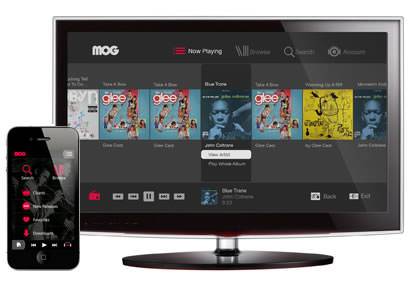Two notable paid subscription streaming music services have announced partnerships and programs aimed at expanding their offerings beyond the desktop and mobile platforms where they currently reside. MOG, an on-demand service providing around 10 million songs for $10/month, has launched its MOG Fusion program, a manufacturer-focused toolkit for integrating MOG into consumer electronics and automobiles.

Rdio, a similarly priced service, but one that’s more social-networking focused, has partnered with Sonos, makers of music systems for the home, to bring Rdio to the living room and elsewhere around the house.
Subscription is the New Black

Neither of these moves are a first for the streaming music industry. Microsoft-powered Zune is already on Xboxes and therefore in the living room, Pandora is seemingly everywhere – including vehicles equipped with Ford SYNC, and several Internet-connected TVs, Blu-ray players, DVRs and other home media center boxes ship with built-in app stores where Pandora, Last.fm and those like them are already present. Plus, let’s not forget the powerhouses: Apple TV and its competitor Google TV, which is set to launch its own Google Music service this year, something it would likely integrate into its TV product.
However, the difference between many of the streaming music services – those also called “streaming radio” services – and what MOG and Rdio provide is that the former play radio-like “stations” based on an artist or genre of music you like, while the latter offer subscription-based music where you can download songs, manage playlists and play any tune on demand at any time. MOG and Rdio aren’t all that different from the most recent incarnation of Napster, for example, the once illegal file-sharing network turned legitimate business, but neither have the clout of the Napster brand name (good or bad as that may be). They do have millions of songs, though, thanks to partnerships with the major labels.
In an increasingly untethered world, mobile music is being delivered on demand, over-the-air, “all you can eat” style, not via downloads that take up physical space on a device…or worse, downloads that must be synced from a desktop to a phone by way of a USB cable.
Both services fill the void the long-rumored “cloud iTunes” may one day offer. But that day has still not arrived, leaving those that want to pay for streaming music via subscription no choice but to look outside Apple’s ecosystem.
So What’s New? A MOG Toolkit for Manufacturers
At the Consumer Electronics Show (CES 2011), MOG has launched something called MOG Fusion, a program that includes all the necessary tools for consumer electronics or auto manufacturers to integrate MOG into their devices or cars. Fusion includes five core APIs (application programming interfaces) which provide access to MOG’s functions and features like playback, search, history, playlists, preferences and more.

However, the service is not wide open – interested suppliers and manufacturers must first contact MOG for access to these tool. Once accepted, they’ll have access to the APIs, documentation and the other necessary info to port MOG to their products. MOG’s launch partner in Fusion is Visteon, a global automotive supplier.
Rdio & Sonos Stream Music in Your Home
Rdio, the company started by Skype founders Niklas Zennstrom and Janus Friis, has partnered with home music system maker Sonos to bring its service to the Sonos Multi-Room Music System, which already has partnerships in place with other music services, like European (and apparently, never to be stateside) service Spotify, plus Last.fm, Pandora, Napster and others.

While maybe not as exciting as a program that aims to put music everywhere, Sonos is a household name whose products are sold in 65 countries (6,200 retailers) worldwide – that’s a big market for Rdio to tap into.
We expect both MOG and Rdio, two of the best choices for U.S. users who don’t have access to the uber-popular, European-based Spotify, to become increasingly competitive in 2011, especially as the Android market grows, where iTunes is not a factor.

















